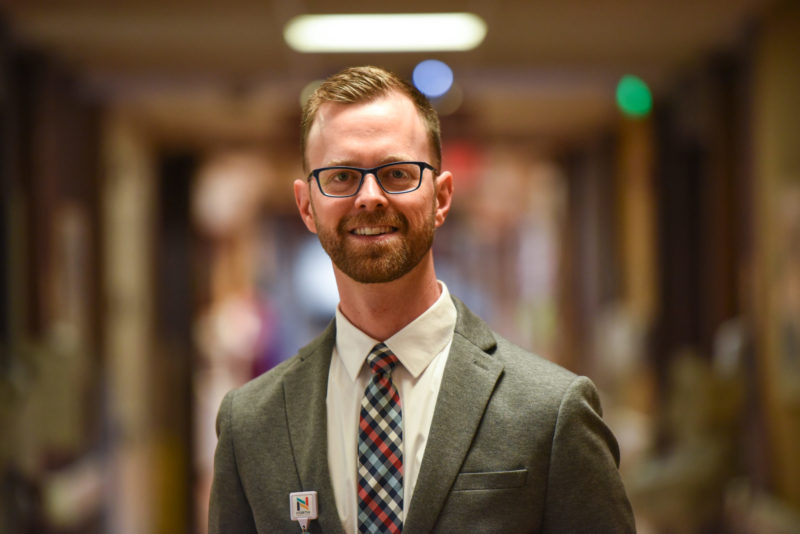Exploring the Hospitalist Program at North Memorial Health
Hospitalists are just starting to celebrate their 20th anniversary as a specialty, but it’s entirely possible you’re just hearing about them now: Perhaps you’ve had one assigned to you in a recent hospital stay, or you’ve learned that instead of your primary care doc a hospitalist will be rounding during your stay.
It’s an adjustment to what used to be the course of care—and it’s a huge step forward for your care, too. Here’s how and why.
What hospitalists do all day (and night)
Believe it or not, hospitalists are one of the fastest growing specialties in the United States, says Dr. Ryan Greiner, one of the medical directors of the hospitalist program. “Think of hospitalists as the primary care doctor of the hospital,” he explains.
Hospitalists are board-certified in their own specialty, such as internal medicine, and have special training and experience to focus on inpatient care.
“Being in the hospital is a special circumstance,” Greiner adds. “You want someone who understands that on a more complex level. They dedicate their entire professional focus to the hospital.”
So what does that look like? In the age of digital medical charts, they are able to easily access your health history—and connect with your primary providers if necessary. Hospitalists will also help coordinate any and all the specialists on your care team, and make sure every team member is on the same page.
“We serve many different roles for the patient,” he says. “We’re advocating for you while you’re in the hospital. We’re helping you understand what specialists are saying. We’re helping you think through your care decisions and come to terms with the impact of a new diagnosis.”
They’re also able to be at your side in a moment’s notice.
Why you want a hospitalist on your care team
One of the most important parts of what hospitalists do is empathize, says Greiner.
“Being hospitalized is one of the most vulnerable experiences you will have in your life. Our job is to acknowledge that vulnerability and bring compassion, empathy, and confidence to the care we provide and then deliver the best possible outcome for your situation,” he says.
Additionally, he says, it’s important that hospitalists make sure you have all the tools to leave—and stay out of —the hospital.
“What we do all day, every day, is shared decision making,” he says. “You’re sick and our job is to help you help yourself. That’s what we do every day. Your input and participation is critical.”

Having a hospitalist really makes a difference
Most hospitalists really love their jobs because of what’s known as the high acuity of care—meaning, they love untangling complex cases. As more and more procedures and care shift to outpatient (meaning, care either not provided at a hospital or at least not with an extended stay), hospital cases shift to the most complex or tenuous care.
Their commitment to complexity shows. Studies repeatedly show that hospitalists’ sole dedication to hospital care improves outcomes for people who are assigned a hospitalist during their stay.
In short, hospitalist care is shown to:
- Decrease length of stay
- Decrease cost of care
- Decrease readmissions to the hospital within two weeks of discharge
They also maintain very close working relationships with all the specialists on the hospital staff.
The North Memorial Advantage: Hospitalists
Not all patients at North Memorial Health will be assigned a hospitalist, but regardless, they will reap the benefits of hospitalists’ presence during their stay.
That’s because hospitalists are constantly working to improve hospital care overall, including care transitions: to home, to a long-term facility, rehabilitation, and more.
They are also involved in administrative work behind the scenes to improve all facets of hospital care. “We’re at the table helping to guide the organization on how best to improve the patient experience and ensure the safest, most evidence based care,” Greiner says.
And, Greiner notes, one of his most important jobs as medical director of the hospitalist program, beyond safety and quality of care, is to also take care of the people who deliver that care.
“Fundamentally, hospitalists are human beings, and despite being highly trained, well-respected pillars of community they are also impacted by the same emotional challenges any person has. If I take care of the emotional well being of providers, we will be able to deliver quality care. They need to be able to feel, to relate, to console. That’s part of it and it’s important to take care of that, too.”
He says he’s proud of the way North Memorial Health has committed to taking care of both patient and employee, and that shows in the commitment, quality of care, and excellent outcomes they’re able to deliver every day.

